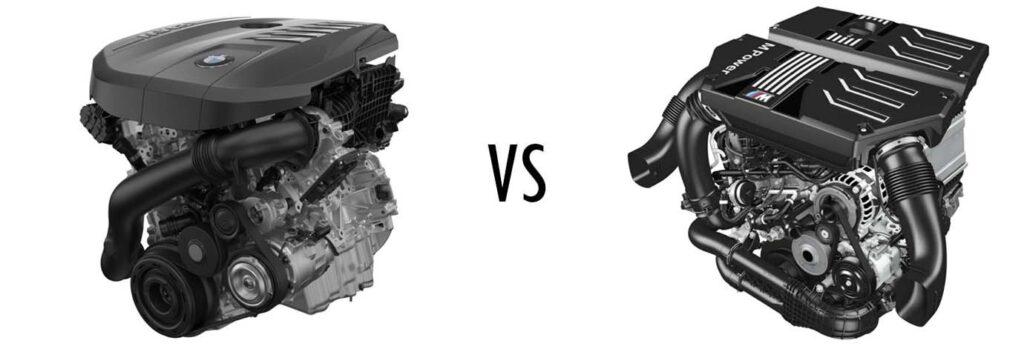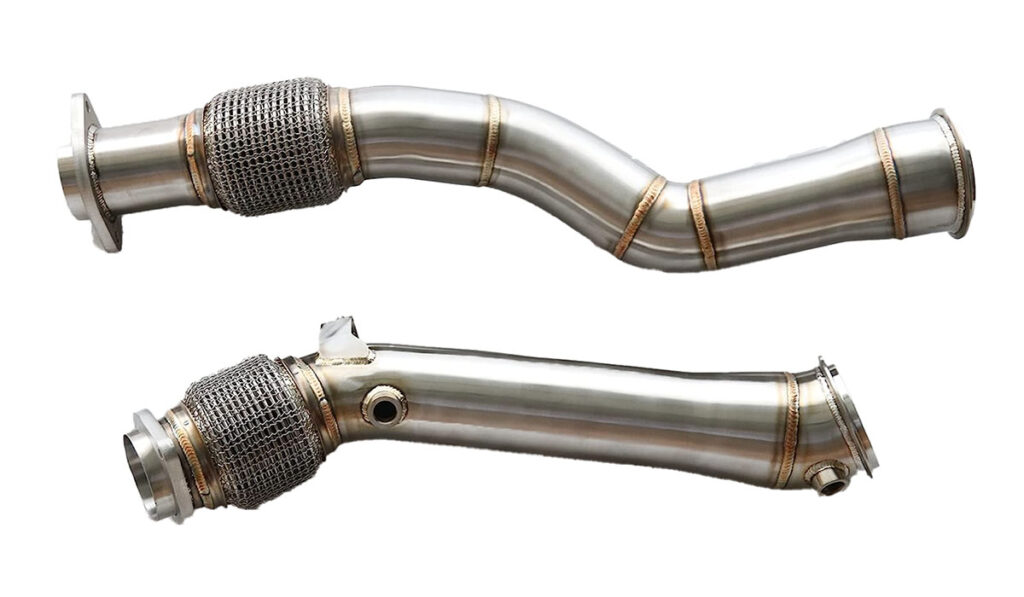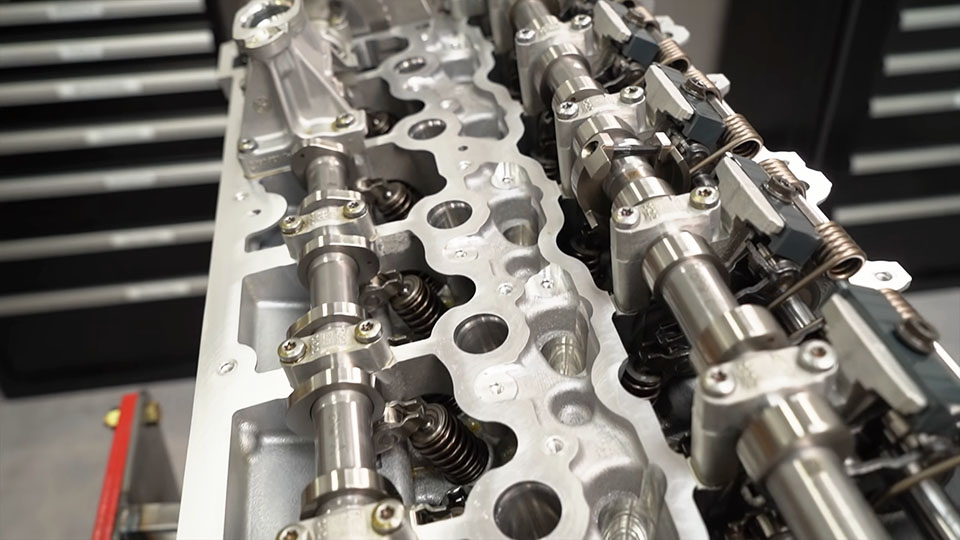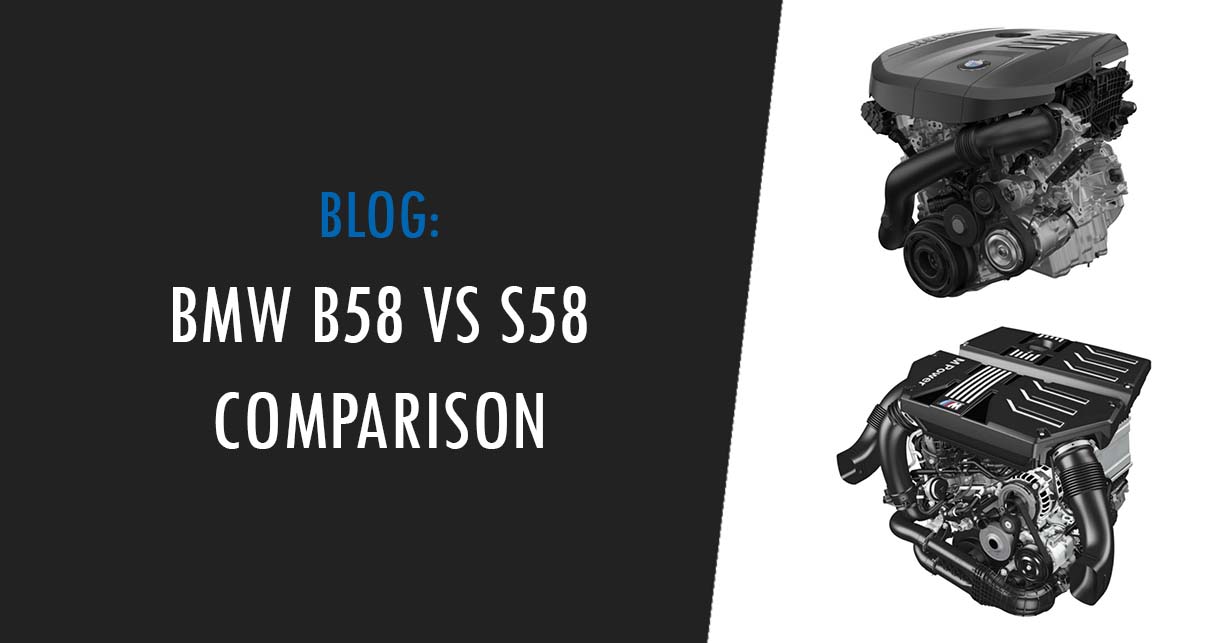BMW has once again demonstrated its ability to produce impressive turbocharged inline-6 engines. The B58 was introduced in 2015, and it has proven to be an engine with significant tuning potential. It is equipped with a new air-to-liquid intercooler, a slightly bigger turbo than its predecessor, and features a closed deck block.
The S58 engine was unveiled in 2019 as the successor of the S55, a true performance-oriented engine for BMW M-series cars. The S58 is the high-performance version of the B58, but there are notable differences between the two. The key distinction lies in the S58’s twin-turbo setup, lower compression ratio, and forged pistons, which means it’s a more capable engine.
Both the B58 and S58 engines are highly tunable, allowing for substantial increases in power output with the addition of a few bolt-ons and an ECU tune. The B58 and the S58 are the most recent iterations of the BMW turbo I6, how do they compare against each other?
BMW B58 vs. BMW S58 Specifications

| B58 | S58 | |
|---|---|---|
| Horsepower | 322–382 hp | 453–503 hp |
| Torque | 332–369 lb-ft | 443 lb-ft |
| Configuration | Inline-six | Inline-six |
| Displacement | 2,998 cc | 2,993 cc |
| Turbocharger | Single twin-scroll turbo with air-to-liquid Intercooler | Twin-turbo (single scroll turbos) with air-to-liquid Intercooler |
| Compression Ratio | 11.0:1 | 9.3:1 |
| Redline | 7,000 rpm | 7,200 rpm |
| Bore & Stroke | 82 mm x 94.6 mm | 84 mm x 90 mm |
| Internals | Forged steel crank, forged rods. Cast pistons. | Forged steel crank, forged pistons & rods. |
| Block Design | Closed-deck block | Closed-deck block |
| Block Material | Aluminum | Aluminum |
| Years Produced | 2015 – present | 2019 – present |
B58 vs. S58 Horsepower & Torque
When comparing the horsepower and torque of both engines in stock form, the S58 is the clear winner out of the two. With 473 hp (which escalates to 503 hp in Competition models) and 443 lb-ft of torque, it outputs significantly more power than even the higher-output version of the B58, which comes in at 382 hp & 369 lb-ft of torque.
The S58 outputs more horsepower & torque than the B58
BMW has done an impressive job at making the S58 make a tremendous amount of torque at low RPMs, the throttle response and low-end torque of this engine feel like that of an engine with a much higher displacement.
The twin-turbo setup of the S58 further helps with power output in the low and mid-range and reduces any hint of turbo lag.
Perhaps the most impressive aspect of the S58 is its top end. Despite being a turbocharged engine, it shines at high RPM, just like it should for an M-engine. A redline of 7,200 RPM almost reminds us of high-revving legends like the S54.
For daily driving, the B58 already has plenty of power
The B58 is an engine with excellent low-end torque and little turbo lag. It’s nothing to scoff at. Its stock performance and power figures are above what BMW rates it at; it’s an M-performance engine just a step below a true M-engine.
A B58-powered car has more than enough power than you will ever need for the street. However, the B58 is a single-turbo engine, and its tamed-down factory tuning makes it noticeably less powerful throughout the RPM range than the twin-turbo S58.
Overall, both the B58 and the S58 have outstanding performance and enjoy linear powerbands with little turbo lag, and you can’t go wrong with either one. However, if you’re looking for an engine with a ludicrous amount of stock horsepower and torque, the S58 is the clear winner.
B58 vs. S58 Tuning & Mods
The B58 is one of the best modern platforms for tuning and offers tuners an unmatched bang for the buck in terms of reliable power gains.
With a simple tune and a catless downpipe, a B58 can gain up to 80 wheel torque, which is quite impressive. Other mods for the B58 include upgraded turbos, port injection, upgraded low pressure fuel pump, upgraded high-pressure fuel pump, free-flowing exhaust, intake upgrades, E85 and E50 fuel compatibility, and improved cooling, among others.
Note that the B58TU available in the M340i is better for tuning as it already incorporates an improved fuel pump and fuel injectors, as well as a more robust timing chain system and better cooling.
It is possible to go beyond 800 whp on the B58, but that would need a fully built engine, and a built transmission, not to mention additional supporting mods like a stronger driveshaft. If you want to reach ~1000 wheel horsepower and beyond, it might be more cost-effective to get an S58-powered car.
The S58 has greater tuning potential than the B58
On the other hand, the S58 is still a relatively new engine, and its full potential is still unknown. Based on its predecessor, we can say that it will be even better for tuning than the B58.
With similar mods, you can expect an even greater power increase on the S58, and its upper limit with stock internals will also be higher due to its stronger engine block and forged internals.
With a simple catless downpipe and a tune, the S58 can already reach ~650 wheel horsepower. With upgraded turbos, 1000 whp is within reach.

The S58 has an inherent reliability advantage for track use due to a beefier cooling system, forged pistons, and a more robust oiling system that can keep oil pressure high even in high-G turns.
Overall, the S58 is better for tuning if you want to get the maximum power out of the engine. The B58 is still a much better value as plenty of mods in the market come at a lower cost, and its tuning potential is excellent.
B58 vs. S58 Sound: which engine sounds better?
The B58 is one of the best-sounding inline-6 engines. Its single turbo setup helps to get the engine noise out, and paired with the right exhaust, it can be loud but refined and put a smile on your face every time you smash the throttle.
The B58 sounds better than the S58
The S58 sounds a bit more muffled due to its twin-turbo setup restricting some of the noise you’ll hear, although it’s an improvement from the S55.
While opinions may vary, most would agree that the B58 engine has a better exhaust note, both in stock form and with aftermarket modifications such as a catless downpipe or an upgraded exhaust system.
Related: BMW B58 vs. S55 Comparison
Yes, it’s a shame that an M-engine can sound so subdued compared to a “regular” BMW engine like the B58, but the twin-turbo setup of the S58 comes at the cost of reduced noise coming out of the exhaust.
B58 vs. S58 Reliability: Are These Engines Reliable?
BMW has significantly improved reliability in its turbocharged inline-6 engines iteration after iteration. The B58 has proven to be the most reliable turbocharged BMW engine, perhaps as reliable as the naturally-aspirated N52. Issues are rare, and issues from the N55 were fixed in the B58.
The B58 is a stout block that can withstand aggressive tuning and abuse, and there are already B58s with 200K+ miles with little to no issues.
The B58 will be more reliable and require less maintenance than the S58
It’s still too early to tell if the S58 will be very reliable, but it will be hard to beat the B58 in terms of long-term longevity.
While the S58 engine is still relatively new, it is expected to be a reliable engine. However, due to its increased complexity and higher power output, there may be more points of failure compared to the B58.
There are many reasons to believe the S58 is as reliable as the S55, but only time will tell once we see more high-mileage motors around.
B58 vs. S58: Technical Differences
The S58 is not just a twin-turbo B58 with a stronger block. BMW modified several key aspects of the engine, from the internals to ancillary components. Here are some of the biggest technical differences between the B58 and the S58:

Engine internals
- The B58 has a cylinder head designed for one high-pressure fuel pump. The S58 cylinder head has mounting points for two high-pressure fuel pumps.
- Crankcase on the S58 is adapted for the bi-turbo setup and has additional oil ducts. Crankcase ventilation is also modified. Additional oil ducts are added for piston cooling.
- The S58 crankshaft is modified, as it has a longer stroke and has to withstand higher RPMs.
- Connecting rods of the S58 are adopted from the S63B44T4 engine, not the same ones used in the B58.
- Piston wrist pins in the S58 are coated in Diamond-Like Carbon.
- The timing chain in the S58 is an adaptation of the timing chain in the B58TU.
Valvetrain and VANOS
- Exhaust camshafts on the S58 have twin triple cams for driving the dual high-pressure fuel pumps. The B58 on the other hand has a single high-pressure fuel pump.
- VANOS system in the S58 has shorter adjusters and a more compact design.
Belt drive
- The belt pulley driving the coolant pump and the alternator are larger on the S58 than on the B58. This is to compensate for the higher RPMs the S58 will usually run at and prevent cavitation near the water pump.
Oiling system
- The oiling system in the B58 is nothing special. The oil pump of the B58TU engine wouldn’t have been capable of providing a reliable oil supply in the S58 at very high RPMs or during hard lateral and longitudinal acceleration. To solve this issue, the S58 uses a spur-gear pump with an integrated twin-oil return pump.
- The oil pump of the S58 is a spur-gear pump, compared to the more traditional tandem oil pump in the B58.
- The S58 also features additional oil return pumps and switchable piston cooling.
Exhaust and intake
- The S58 has a new air intake duct for indirect charge air cooling and additional clean air ducts.
- The exhaust is optimized for exhaust gas pressure, for a more free-flowing exhaust than the B58.
Fuel preparation
- The S58 has two high-pressure fuel pumps compared to just one in the B58TU.
Cooling system
- A split-cooling system was introduced in the B58TU but it is no longer present in the S58. Instead, the S58 uses a more robust high-temperature coolant circuit for engine coolant with a mechanical pump and an auxiliary electric coolant pump for the exhaust turbocharger.
- The S58 also features a low-temperature coolant circuit only for indirect air charge cooling. This low temperature circuit has its own electric coolant pump.
Final Thoughts
The BMW B58 has quickly gained fame as one of the best inline-6 engines ever made, rivaling legends such as the 2JZ. It is currently the best powerplant for those looking for a budget build that reacts to modifications well while maintaining its reliability.
On the other hand, the new S58 powering the new M cars is already a torque monster in stock form, and its true tuning potential has yet to be seen.
Both the B58 and S58 engines are remarkable powerplants that demonstrate BMW’s commitment to developing and refining the inline-6 Both will go down in history as some of the best turbocharged inline-6 engines.
You can’t go wrong with either if you decide to acquire a performance-oriented BMW. Do you prefer the B58 or the S58? If you have any suggestions, contact us here.
Sources:
- BMW S58 Technical Training Information
- BMW B58 Technical Training Information

